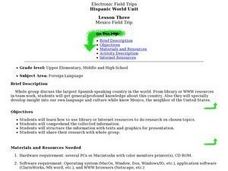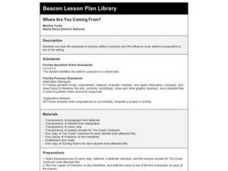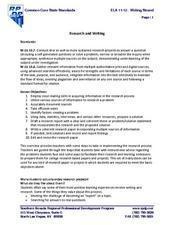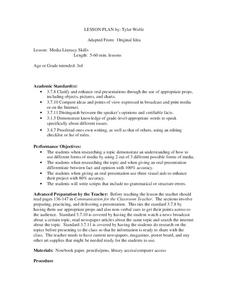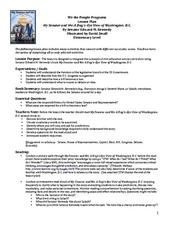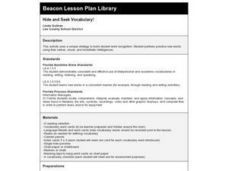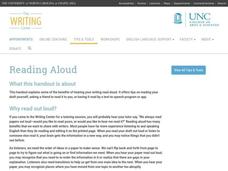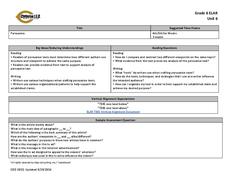Curated OER
Summarization Superstars
How do you read when you know you're going to be summarizing a text? Summarize a nonfiction text with your upper elementary schoolers. Your pupils independently read a nonfiction article and write a summary paragraph using the six-step...
Curated OER
Shorten the Length
Learn how to summarize by identifying main ideas and supporting details. Readers cross out unimportant information as they read through a text. Is it a random detail? Cross it out! They then draw a concept map, placing the main idea in...
Curated OER
Mexico Field Trip
Explore how the library or Internet resources function as textual information. Young writers research a chosen topic then read and comprehend the collected information. They structure the information with texts and graphics for a...
Curated OER
Where Are You Coming From?
Pupils examine and discuss author's purpose and the influence of an author's perspective in his or her writing. In groups, they read scenarios and respond to them from the perspective of a designated character. Materials are attached.
Southern Nevada Regional Professional Development Program
Researching and Writing
Designed for teachers, this resource identifies problems learners face when attempting a research project and approaches instructors can use to help their class members overcome these obstacles. Suggestions are included for how to help...
Curated OER
Symbols and the Choices we Make
Upper elementary and middle schoolers recognize symbols that influence the choices that we make consciously or unconsciously in everyday life. They look at the symbols and choices that others make. They identify and apply knowledge of...
Curated OER
Anticipation Guides Improve Reading Comprehension
Beginning with anticipation guide strategies is a powerful method for improving reading comprehension. First, list initial ideas for a topic the class will be reading about. These ideas are formulated into statements, some of which are...
Curated OER
From A Different Perspective
Emerging writers create a response to their reading. They read Notes from the Trail and discuss whose perspective the journal entry is written from. Then, they write a response to the journal entry in first person perspective as if...
Curated OER
Media Literacy Skills
You're on camera! Third graders find a news story and research it to get more information. Everyone uses their found information to write a script and create their own news broadcast!
Curated OER
Frederick Douglass Expository Reading Guide
Help your high schoolers navigate the cross-curricular text Narrative of the Life of Frederick Douglass with this reading guide. The questions guide learners through composing a summary of any given chapter in the text. In addition,...
Curated OER
My Senator and Me: A Dog's-Eye View of Washington, D.C.
Although this legislative process lesson is designed to accompany a specific text, it is valuable independently. Young learners participate in a picture walk (worksheet included) through My Senator and Me: A Dog's-Eye View...
Curated OER
Finding Your Way in the World Wide Web
Researchers practice grouping items to explore the concept of a database. They apply these concepts to the WWW search engine format and consider why it is important to enter the most specific information.
Curated OER
Mapping Out the Story
Discuss the reading comprehension strategy of summarization with your elementary schoolers! They read a chapter from their social studies textbook, Regions Near and Far, and create a map, or word web, for the chapter. They identify...
Curated OER
Hide and Seek Vocabulary!
Third graders practice word recognition and vocabulary building. They find word cards in the classroom. Then they practice reading the words and using them in sentences. Additional practice is gained by writing the words and using them...
California Education Partners
Eleven
It is difficult to articulate how growing up feels as accurately and beautifully as Sandra Cisneros does in her short story "Eleven." After seventh graders read the story and note the author's use of figurative language, they respond to...
California Education Partners
Grapes of Wrath
To demonstrate their ability to comprehend complex text, individuals analyze the details, syntax, and diction John Steinbeck uses in a passage from The Grapes of Wrath to reveal the develop and evolution of Mae's character.
California Education Partners
The Road Not Taken
An effective lesson plan truly can make all the difference. Seventh graders read, analyze, and annotate Robert Frost's "The Road Not Taken" before writing an essay about what they believe to be the theme of the iconic poem.
Curated OER
Express Yourself Lesson Seed 12: Story Event
Focus on plot and the impact-specific events in The Cay. Class members use their double-entry journals, created in a previous lesson in this series, to record their thinking about the guiding question as they read chapters 15 through 17....
California Education Partners
Hope Despair Memory
Elie Wiesel's "Hope, Despair and Memory" provides ninth graders an opportunity to demonstrate their ability to analyze complex text. Individuals craft an essay that draws evidence from the text of the speech to show how Wiesel develops...
Curated OER
A Season for Chapters
Art, music, poetry, and the beauty of the seasons is what you'll find in this very nice unit idea. You can use any of the suggested books and activities to engage your second graders in an exploration of the changes that take place...
Florida Center for Reading Research
Comprehension: Monitoring for Understanding, Simple Summary
Can your class sum up a text in a few sentences? Help them build this skill by starting nice and slow. For this summarizing activity, the teacher marks the main ideas with sticky notes. Learners read and reread the text, pausing at the...
University of North Carolina
Reading Aloud
Warning: reading your paper aloud may cause bystanders to think you're talking to yourself. However, as the 14th installment of 24 in the Writing the Paper series from UNC explains, it is one of the best strategies for revision. Through...
EngageNY
Analyzing Point of View: Inferring about the Natural Disaster in Eight Days
Who is telling the story? Readers take a look at the text Eight Days to determine if the story is told in first or third person. They then discuss in groups and complete a shared writing activity to describe how the narrator's point of...
Cleburne Independent School District
Grade 6 English Language Arts and Readiness: Persuasive
What is the best way to compare and contrast viewpoints on the same topic? A persuasive writing unit plan addresses targeted skills, vocabulary, instructional strategies, and suggested resources that would be perfect for developing writers.




